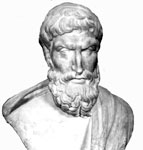Chapter 19. "Pleasure is the Good" by Epicurus

Epicurus, Kapitolinisches Museum, Rome
About the author…
Epicurus (341-271 BCE) lived in the generation after Plato and Aristotle. Although he spent his early years in the Athenian colony of Sámos, in Athenian military service, and in Lampsacus, he was able to study the philosophy of Plato and Democritus while developing a thoroughly empiricist mechanistic materialism. Later he moved to Athens to establish the Garden, a devoted school and community of followers including both men and women with an attending, at times, scandalous reputation. Diogenes Laëtius the Roman historian who lived five centuries later noted that Epicurus wrote extensively on physics, ethics, and religion. Even so, with the exception of several writings, all were destroyed during the development of early Christianity. Much of our information about Epicurus is based on the Roman writers, especially the biographer Diogenes Laëtius. Lucretius's De Rerum Natura develops and extends the Epicurean philosophy.
About the work…
In this reading, several fragments of Epicurus' writing[1] are taken as representative of Epicurean ethics. Epicurus believes that nature is made up of atoms (and compounds of atoms) developing by natural selection. On his view, although the universe is unbounded space and time, the soul is bound and distributed throughout the body which disintegrates at death. Free will is based on the nondeterministic motion of some atoms. The Epicurean ethics of sometimes popularly confused with the hedonism of the Cyrenaics since both philosophies believe pleasure is the greatest good. However, Epicurus emphasized a calm and tranquil life based on pleasures of the soul rather than pleasures of the body. Happiness is based on the reduction of pain and fear through the employment practical reasoning. Because happiness is empirically identified with pleasure, Epicurus's philosophy is often described as "egoistic hedonism."
Ideas of Interest from "The Life of Epicurus"
According to Epicurus, why is death not to be feared?
Does Epicurus distinguish between "good" and "pleasure"? In what does pleasure consist?
How does Epicurus distinguish between good and contentment?
According to Epicurus, what kinds of things make life pleasant?
What virtue is even more important that the study of philosophy?
According to Epicurus, what is logically equivalent to living "prudently, and honorably, and justly"?
What does Epicurus say is the most important thing for a whole life of happiness? What reasons does he give for why this aspect of wisdom is needed? Does his reasoning imply that the nature of man is, as Aristotle points out, "a social animal"?
Explain Epicurus' theory of justice.